|
|
Arjuna’s dilemma
In part 1 of the article, we looked at the historical background and the events that lead to the Kurukshetra war. As we saw, Arjuna, on seeing all his relatives, cousins, teachers, elders etc. across the battle line, refuses to fight and lays down his bow and arrow. He feels despondent and dejected and finally requests Krishna to show him the right path:
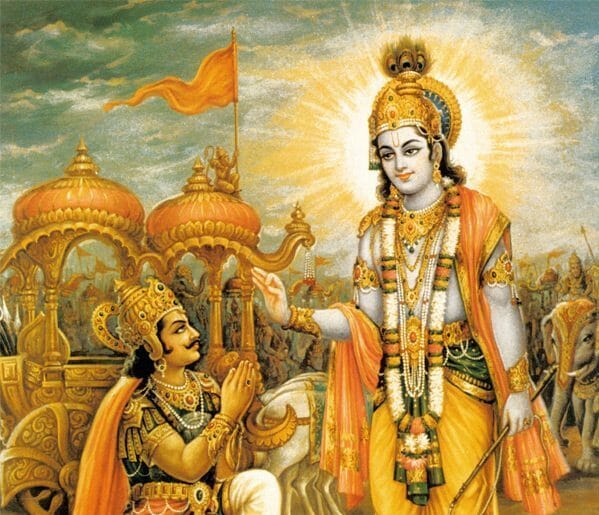
Arjuna seeks Krishna’s guidance
“I am totally confused about what my duty is, I have lost my mental balance and unable to decide what is right and wrong, and am feeling weak. As your disciple, I request you to please guide me and tell me with certainty as to what is best for me.” (Gita 2.7)
The message of Gita begins with verse 11, Chapter 2. The rest of the Gita is a dialogue between Krishna and Arjuna wherein Krishna unfolds the “wisdom of life”. Of course, the main thrust of Krishna’s message is to convince Arjuna that, being a member of the warrior class (kshatriya), it is his duty to fight the war to uphold dharma and root out evil. In the course of his message, Krishna talks about a large number of topics related to life, death, the soul, our duty in life, how to attain salvation and many more.
Continue reading »
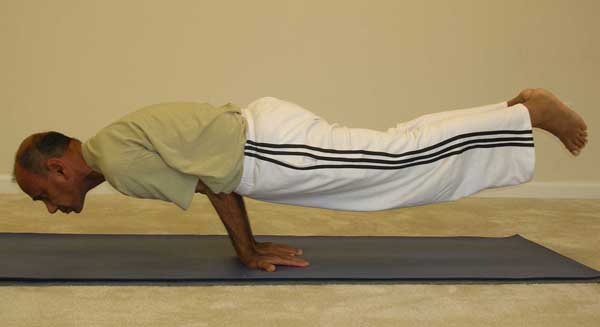
Mayurasana (Peacock)
I am pleased to announce the next 21-day Level 2 Yoga Immersion program. I invite you to join me on this exciting and deeply rewarding yoga journey.
Please note the class duration will be an hour and 45 minutes.
You can participate in the program online via zoom or in-person at my home studio.
You can download the 21-day Yoga Immersion flyer here. Feel free to share it with your own distribution lists.
Prerequisite:
- An ongoing yoga practice including asana and pranayama.
- Ability to practice basic asanas and asana sequences like Surya Namaskara etc.
Program Info:
- What: 21-day yoga immersion, Level 2
- When: Monday, Oct 31 – Sunday, Nov 20, 2022
- Time: 6:00 AM – 7:45 AM (US East Coast time)
- In-person participation: at my home studio located at 206 Redwood Park Drive, Morrisville, NC 27560
- Zoom Access: Login info will be provided upon receipt of registration and payment
- Instructor: Subhash Mittal
- Fee:
- To register: Fill out the registration form, providing information in all the fields, and submit it online
Continue reading »
Two texts that are considered essential reading for a serious student of yoga are the Bhagavad Gita and the Yoga Sutras by Patanjali. You can read a basic introduction to the yoga sutras on my blog here. In the present article, I’ll be presenting the essential message of the Bhagavad Gita.
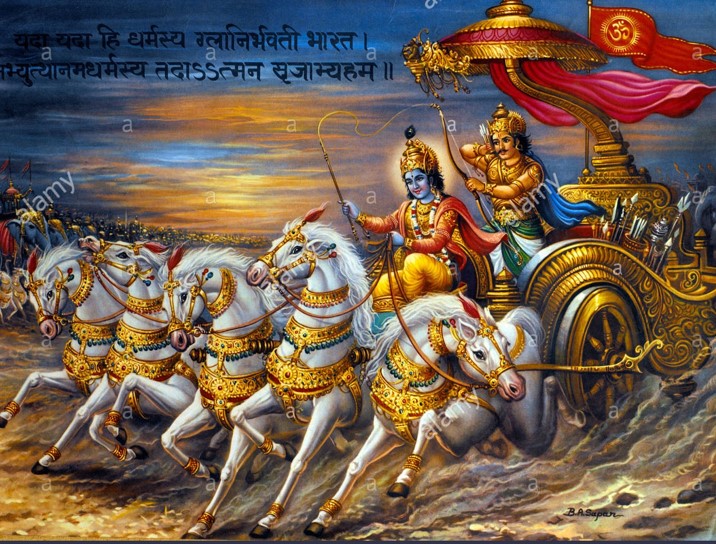
Charioteer Krishna and Arjuna
Bhagavad Gita is a part of a large epic text called the Mahābhārata. Mahābhārata and Ramāyaṇa are two of the very significant epic texts in India. Most of the current social fabric of modern India is largely weaved around the message conveyed through the pages of these two texts. Even though a precise date as to when the Mahābhārata was written is not available, most historians tend to put the date around 3000 BCE. The text was written by Veda Vyasa and the scribe for the text is believed to be Lord Gaṇesha. It is known to be the longest epic poem written comprising of 100,000 verses.
Continue reading »
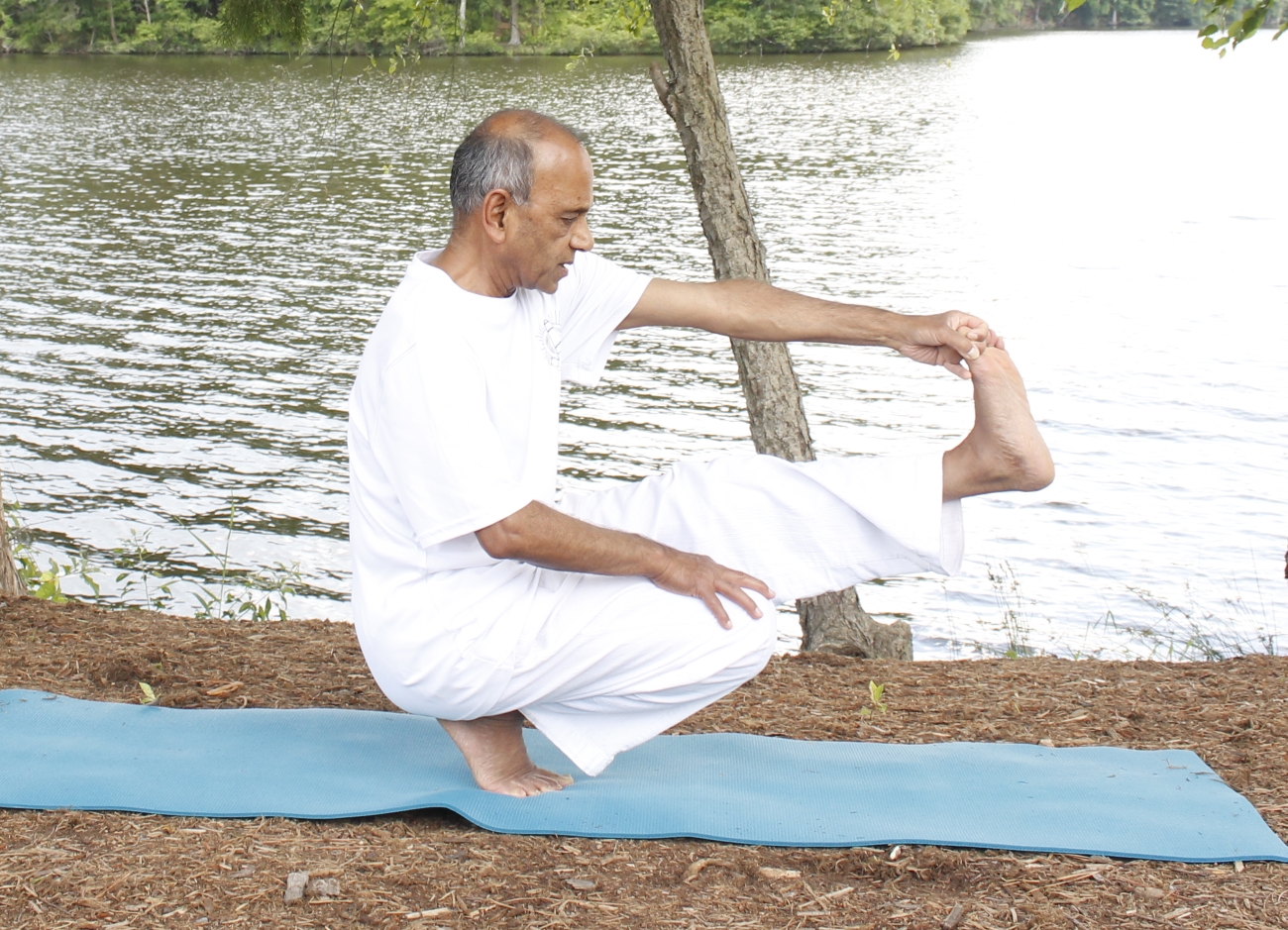
Tip-toe balance
21 days to Transformation
I am pleased to announce the next 21-day Yoga Immersion program. The past programs have been very well received by all the participants. For most of them, it has been truly a life-transforming experience. I invite you to join me on this exciting and deeply rewarding 21-day yoga journey.
You can download the 21-day Yoga Immersion flyer here. Feel free to share it with your own distribution lists.
No prior asana, pranayama or meditation experience is required.
You can participate in the program online via zoom or in-person at my home studio.
- What: 21-day yoga immersion
- When: Monday, Sept 26 – Sunday, Oct 16, 2022
- Time: 6:00 AM – 7:30 AM (US East Coast (Ney York) time)
- In-person participation: at my home studio located at 206 Redwood Park Drive, Morrisville, NC 27560
- Zoom Access: Login info will be provided upon receipt of registration and payment
- Instructor: Subhash Mittal
- Fee:
- To register: Fill out the registration form, providing information in all the fields, and submit it online
Continue reading »
Introduction
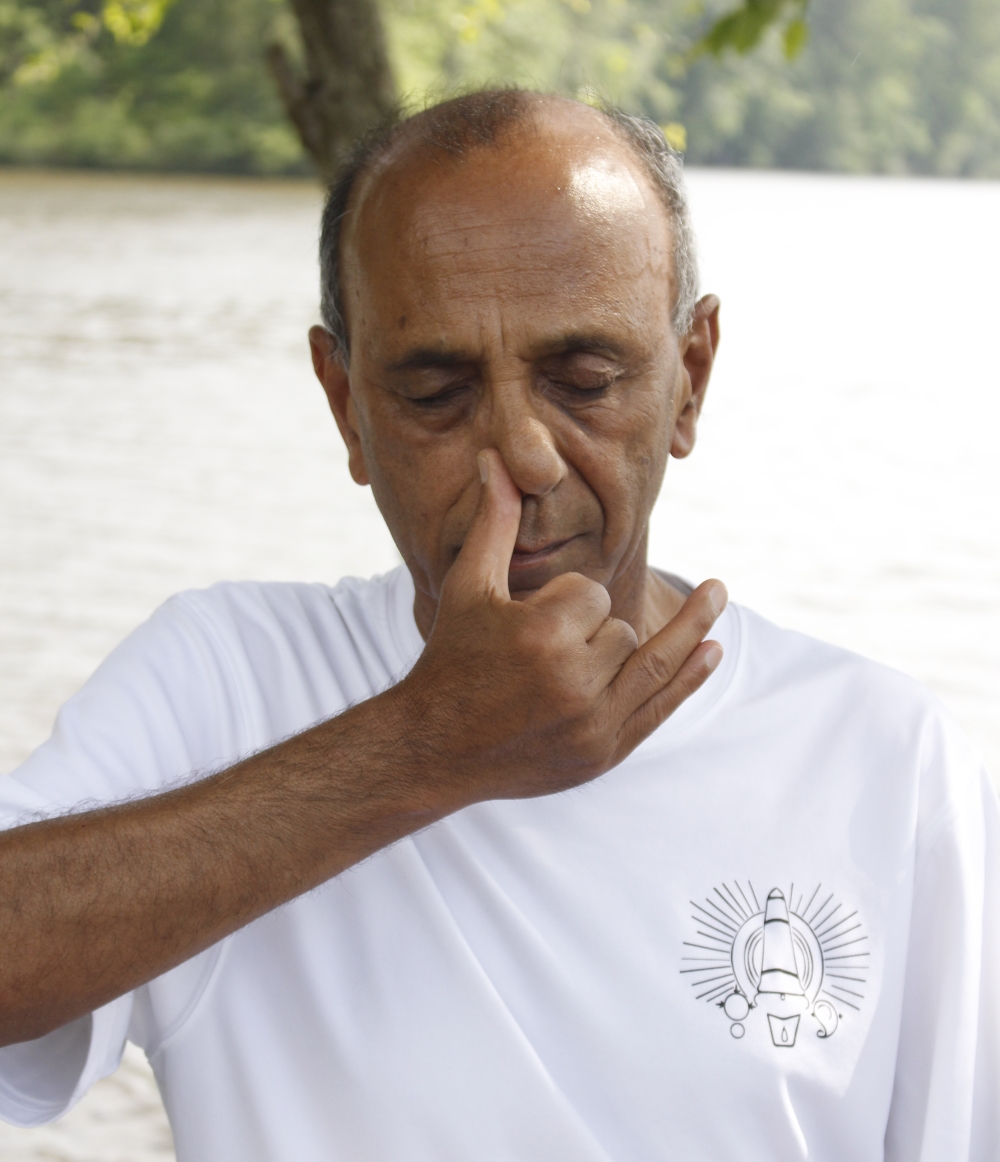
Vishnu Mudra
To breathe is to live, and without breath there is no life. As you may be aware, the theory of Karma is recognized as a key part of the Indian philosophy. As stated by Patanjali in the Yoga Sutras (sutra 2.13), our karmas determine these three attributes of our future birth – future species that we’ll be born into (jāti), our life span (āyus) and the nature life experiences – pleasant or otherwise (bhoga). One of the common beliefs is that the life span is measured in terms of the number of breaths that are allocated to us at the time of birth based on our karma. So, from the first inhalation taken by a newborn at the time of birth to the last exhalation at the time of death, the total number of breaths is predetermined by the previous karma.
Prāṇa, the most important function of the body
Breathing may be considered the most important of all the functions of the body. All the other functions, physical, physiological, mental etc., depend upon it. Man may survive for some time without food, even up to a few months; a shorter time without drinking; but without breathing one’s existence may be measured by a few minutes.
There is a well-known story in the Chandoyga Upanishad (5.1.6-15) which tells of a dispute among all the sense organs, each claiming its superiority over the others. To resolve the dispute, they all went to Prajapati, their father and asked him, “who is the best among us?” Continue reading »
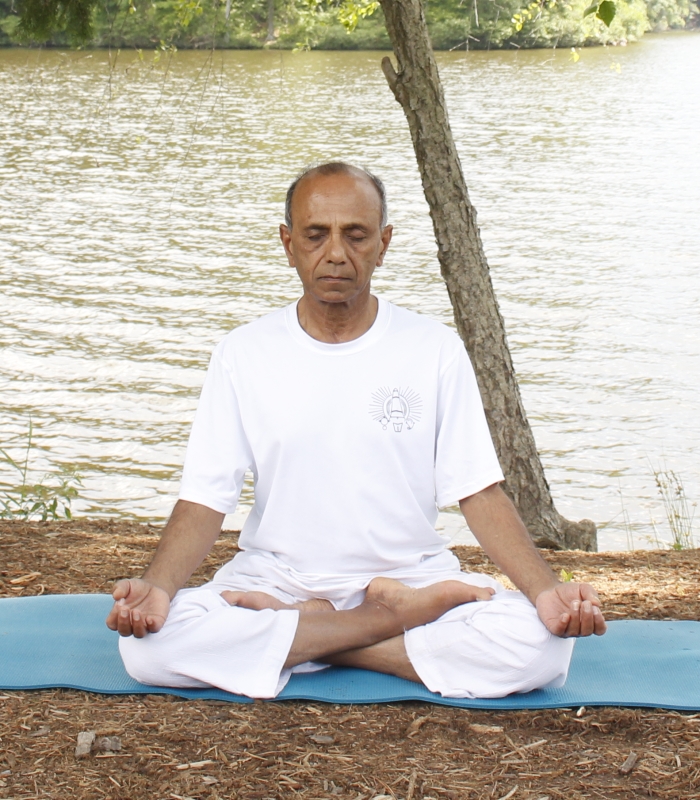
Padmasana (Lotus Pose)
I am pleased to announce the next 14-day Meditation Intensive. In this program, I will be presenting the basic concepts of meditation and practice several meditation techniques. Most of the information that I will be sharing is based on the concepts discussed in Patanjali’s Yoga Sutras and related classical yoga texts.
No prior asana, pranayama or meditation experience is required.
Flyer: You can view/download the program flyer here. Feel free to share it on social media and with your own distribution lists.
You can join the class either online via zoom or in person at my home yoga studio.

Program Information
- What: 14-day Meditation Intensive
- When: Thursday, August 18 – Wednesday, August 31, 2022
- Time: 6:00 – 7:30 AM (US East Coast time, EST)
- In-person: At my home studio located at 206 Redwood Park Drive, Morrisville, NC 27560
- Zoom access: The link to access via zoom will be provided upon receipt of registration and payment.
- Instructor: Subhash Mittal
- Fee:
- $90 – check, Zelle (use subhashmittal@gmail.com) or Venmo (use 9199269717)
- $95 – paypal (go to bottom of page)
- To register: fill out the registration form and submit it online.
- Daily Routine: Light stretching (10-15 minutes), Pranayama (15 min), Relaxation (10-15 min), Discussion and meditation practice (40-45 min)
- Commitment: A firm commitment to follow this schedule and attend every day
Strongly recommended
- Light,’sattvic’, nutritious, VEGETARIAN food
- No alcohol, drugs, tobacco or any other item of similar nature
- A personal commitment to continue the practice after the program is over
Please visit here for more details…
Do not hesitate to contact me if you have any questions. I look forward to your participation.

Padmasana (Lotus Pose)
In the past, I have written about the concept of kumbhaka (breath retention) as one of the attributes of breath used in various pranayama practices. In today’s post I will discuss the integration of kumbhaka and bandhas (energy locks) in one of most commonly practiced pranayama techniques – alternate nostril breathing (Naadi Shuddhi or Anuloma Viloma). I have discussed the basic technique for Naadi Shuddhi in an earlier post.
In a previous post, I also discussed the practice of bandhas (pranic locks). These bandhas are usually applied while the breath is being retained in kumbhaka. It is, therefore, natural and common to practice both kumbhaka and bandha together.
Continue reading »
In previous articles, I have talked about the concept of the four components of a breathing cycle – inhalation (pūraka), exhalation (rechaka), retention (called kumbhaka) after inhalation (antara-kumbhaka), and retention after exhalation (bāhya kumbhaka). In addition to these, breath retention can be introduced at any time during the process of inhalation or exhalation. One of the prāṇāyāma practices that involves such a breathing technique is called “viloma prāṇāyāma” or “staircase breathing” in English. In the viloma prāṇāyāma we interrupt the breathing cycle in steps of two seconds for a duration of two seconds each. For example, during inhalation we begin by inhaling for two seconds, then hold the breath for two seconds, again inhale for two seconds and continue in this manner until we reach the end of inhalation. Similarly, during exhalation we create these two second steps. Because of this step-wise progression of breathing, this technique is commonly translated as the “staircase breathing” in English.
I hope you will enjoy practicing with me using the video presentation.
Continue reading »

Padmasana (Lotus Pose)
I am pleased to announce the next Pranayama intensive. In this program, we will be practicing some of the main pranayama techniques given in our ancient yoga texts. I will also discuss the underlying concepts in the practice of pranayama and all the wonderful benefits that the practice can bring us.
You can join the program either online via zoom or in person at my home studio.
You can view/download the program flyer here. Feel free to share it with your own distribution lists.
A brief outline of what I plan to cover in the course is given in this document (pdf format) in my dropbox folder.
No prior yoga (asana, pranayama or meditation) experience is required.
Continue reading »
 Tip-toe balance 21 days to Transformation
I am pleased to announce the next 21-day Yoga Immersion program. The past programs have been very well received by all the participants. For most of them, it has been truly a life-transforming experience. I invite you to join me on this exciting and deeply rewarding 21-day yoga journey.
You can download the 21-day Yoga Immersion flyer here. Feel free to share it with your own distribution lists.
No prior asana, pranayama or meditation experience is required.
You can participate in the program online via zoom or in-person at my home studio.
- What: 21-day yoga immersion
- When: Friday, June 10 – Thursday, June 30, 2022
- Time: 6:00 AM – 7:30 AM (US East Coast (Ney York) time)
- In-person participation: at my home studio located at 206 Redwood Park Drive, Morrisville, NC 27560
- Zoom Access: Login info will be provided upon receipt of registration and payment
- Instructor: Subhash Mittal
- Fee:
Continue reading »
|
Video DVD
Yoga with Subhash (asana and pranayama)
- Basic asana sequence (~50 min) ($18)
- Pranayama/Meditation (~35 min) ($12)
- Set of above two ($25)
Video recording of special programs offered in the past
(Links to YouTube videos will be provided)
- 21-day yoga immersion - $40
- 7-day hip opening intensive - $20
- 14-day meditation intensive - $30
- 14-day pranayama intensive - $30
- 7-day hamstring/quad intensive - $20
- 14-day Level 2 yoga intensive - $35
Payment options:
- cash, check, Zelle (use subhashmittal@gmail.com) or Venmo (use 9199269717)
- PayPal (go to bottom of page) (add $5 to the fee listed above)
Please contact me if you would like to buy.
|







Recent Comments